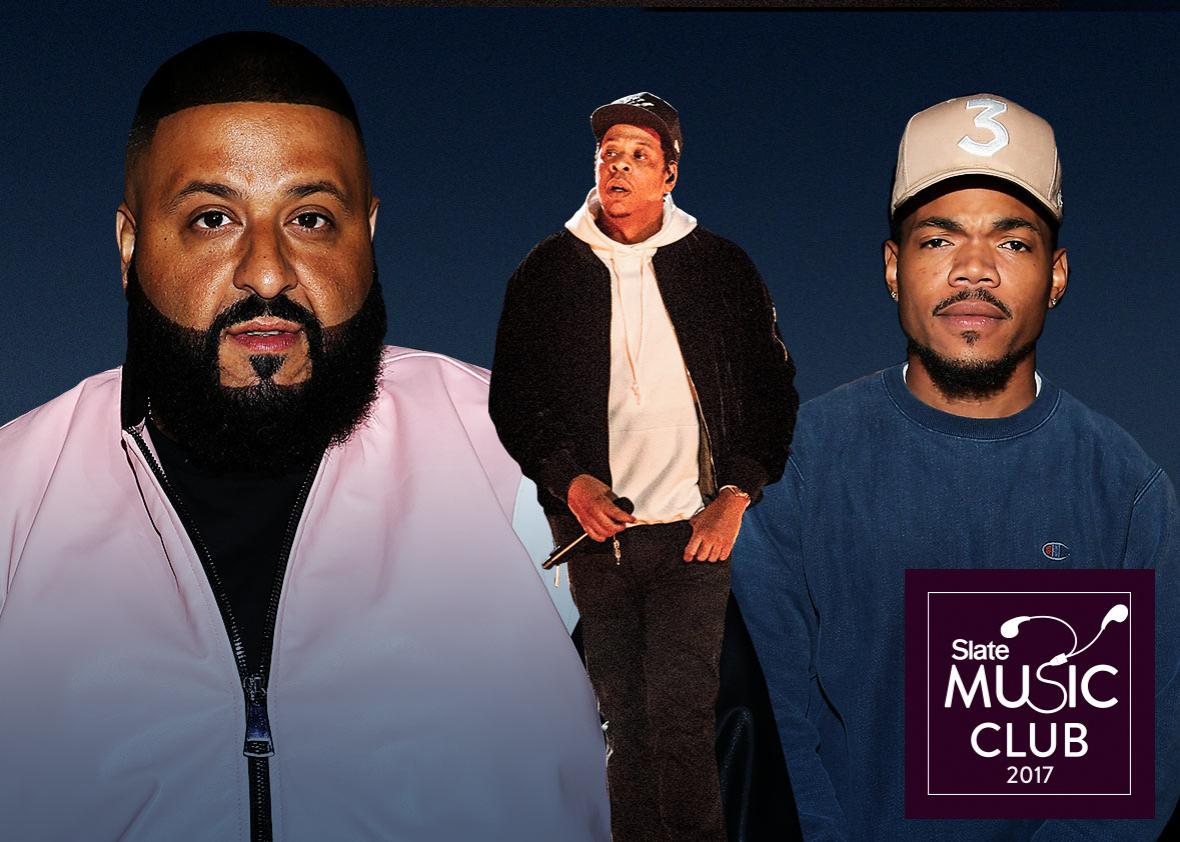It’s hard to think about what you’ve lost …
So in the interest of optimism, Carl, let’s also talk about birth: most specifically, the unexpected and rather strange rise of an infant child to one of the music industry’s most vaunted and media-celebrated “executive producers,” that of Asahd Tuck Khaled. The concept of babies as musical inspiration is nothing new—this year, it led to Jay Z’s sweetest verse, sweeter even than all the ones on 4:44, on “Shining,” about the Twins (“I want a boy and a girl to fight for truth/ Whatever God give me, I’m cool”)—but DJ Khaled’s savvy for social media and willingness to brand took proud parenting to unforeseen heights, culminating in his and wife Nicole Tuck’s 6-month-old lamping elbows up in a hot tub for the cover of Grateful.
While Asahd might need some heavy therapy later on in life (who doesn’t), in the process, Khaled and his male collaborators’ enthusiasm for fatherhood brought visibility and more importantly status to shared parental labor. While I don’t believe men should be vaunted disproportionately for doing what is still socially and politically shunted onto women as our Judeo-Christian duty, we live in a time when our Vice President creepily refers to his wife as “Mother,” so it’s an important reprieve for all of us to hear some grown-ass men bragging about their grown-ass duties as dads. (And at the very least, it’s a nice corrective to the “Overrated” era.) On Grateful, whose songs typically ruled the summer with Khaled’s hit arsenal, the producer and Chance the Rapper (newly child support–resolved) celebrated and vehemently loved their babies with “I Love You So Much,” one of the most inspiring and earnestly heartfelt songs I heard this year. Over a Marvin Sapp gospel sample, Khaled administers a signature sort of pump-up-the-crowd prayer, vehemently exhorting to his baby, “You’re a mogul! You’re an icon! … I love you!” Its emotional peak culminates in Chance rapping the alphabet, a tangible representation of the most basic of duties in raising a child, a rap Sesame Street segment for the unabashedly sentimental.
My love for this song was tied up in the concept of “emotional labor,” which was, as many wrote this year, a key concept for the women-led cultural shift. Tom Petty’s loss brought me back to The Defiant Ones, HBO’s series about the careers of Jimmy Iovine and Dr. Dre, which succeeded despite its rather pro-Jimmy slant. Aside from showcasing rare, chilling, powerful footage of Stevie Nicks cutting “Edge of Seventeen,” it reminded us that Tom Petty’s career really took off after “Stop Draggin’ My Heart Around,” which Petty had to be cajoled to do, not wanting to rely on a poppier, more popular woman to take his career to the next level. On one hand, artistically, the concept of autonomy and integrity makes sense, but on the other it struck me as a particularly male conceit, the way female musicians and “music for women” is historically and continuously undermined as less serious, less cool, less pop.
And so if 2017 was the year we fought back—had to, of necessity—the most temperature-accurate project was the Ann-helmed Turning the Tables, which Carl previously mentioned, about reframing the historical canon so that it not only includes female musicians but centers them. And the basis on which it rested—an “intervention,” as you wrote, Ann—was one of the few things from this year that give me hope for the next one. But something that I think others, including the otherwise brilliant Wesley Morris, really missed about this intervention was that women have always been making our own canons out of necessity. My favorite song of all time is Yo-Yo’s “You Can’t Play With My Yo-Yo,” not because Ice Cube helped put her on, but because of how she treated that power as an opportunity to create a feminist anthem, and my favorite song of 2017 is “Bodak Amarillo” for similar reasons—when we are not listened to, we’ll make ourselves be heard.
To next year (although I pack a real small gat in my purse),
Julianne
